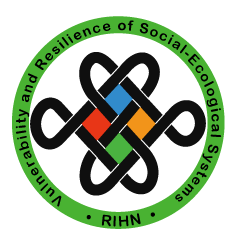Abstract of Working Paper on Social-Ecological Resilience Series
| No.2008-001 | No.2008-002 | No.2008-003 |
Working Paper on Social-Ecological Resilience Series
No. 2008-001
Synthesis of Soil Management Options for Better Targeting of
Technologies and Ecological Resilience under Variable
Environmental Conditions
Moses Mwale
Zambia Agriculture Research Institute
March 2008
ABSTRACT
Lack of access to food and its availability is of central concern in Africa and a fundamental challenge for human welfare and economic growth. Low agricultural production results in low incomes, poor nutrition, vulnerability to risks and lack of empowerment. The New Partnership for Africa’s Development (NEPAD) targets an average annual increase of 6% in agricultural productivity to ensure food security and sustained national economies. Land degradation and soil fertility or nutrient depletion are considered as the major threats to food security and natural resource conservation in the semi arid tropics (SAT). What is needed is to break the cycle between poverty and land degradation in Africa by employing strategies that empower farmers economically and promoting sustainable agricultural intensification using efficient, effective and affordable agricultural technologies. Such affordable management systems should be accessible to the poor, small-scale producers and the approach should be holistic and dynamic in order to foster both technical and institutional change. This paper aims to increase the dissemination of our knowledge base on soils and its management in Zambia. This includes issues of soil conservation and conservation farming. The main activities being to: inventories available technologies for alleviating land degradation and how to demonstrate and adapt the best-bets in farmers’ circumstances using farmer participatory approaches; scale up best bet technologies for sustainable land management and marketing options through the use of appropriate tools, methods and strategies; and to study the resulting ecological resilience under variable environmental conditions.要旨
食料へのアクセスの不足と食料供給量の不足はアフリカでの主要な問題であり、 人間の福祉と経済成長のための基本的な課題である。低農業生産は、低所得、栄養不足、 リスクへの脆弱性、エンパワーメントの欠如をもたらす。アフリカ開発のための新パー トナーシップ(NEPAD)は、食糧安全保障と持続的国家経済を確保するために年間平均6% の農業生産性の増加が目標である。土地荒廃と土壌肥沃度の枯渇、すなわち土壌養分の 枯渇が、半乾燥熱帯(SAT)での食糧安全保障と自然資源保全に対する大きな脅威である とかんがえられている。アフリカでは、農民に経済力を与えること、効率的で、有効な、 手頃な農業技術を用いて持続的な農業集約化を推進することによって、貧困と土地荒廃 の間にあるサイクルを壊すことが必要である。そのような手頃な管理システムは貧しく、 小規模な生産者にとって利用しやすく、そのアプローチは技術的、制度的な変化を促進 するために全体論的でありダイナミックでなければならない。 本論文は、ザンビアで の土壌とその管理に基づく知識を普及することが目標である。土壌保全と保全型農業の 問題を含んでいる。主な取り組みは、1.土地荒廃を軽減するのに利用可能な技術を棚 卸しすること、そして農民参加型アプローチから農民の事情を踏まえた最善の策をどの ように示し、適用するかということ、2.適切なツール、方法、戦略の利用を通じて持 続的な土地管理やマーケティングオプションのための最善の策を拡大すること、3.環 境変動下で結果として生じる生態レジリアンスを研究することであるWorking Paper on Social-Ecological Resilience Series
No. 2008-002
Impact of 2004/2005 Drought on Zambia’s
Agricultural Production: Preliminary Results
Thamana Lekprichakul
Research Institute for Humanity and Nature
March 2008
Abstract
This paper examined the extents of Zambia’s crop losses resulting from the 2004/2005 agricultural droughts and how the impacts were distributed among different cropping systems. The drought analysis is based on the Post Harvest Survey of 2003/2004 and 2004/2005 agricultural seasons, conducted annually by the Central Statistical Office (CSO). The results indicated that the 2004/2005 agricultural drought may have been more serious than initially thought. The extents of crop damages were comparable to the severest drought in recent history in 1991/1992 agricultural season. This was due largely to a rapid expansion of cultivated areas in the 2004/2005 of approximately 50% over the 2003/2004 season. The yield losses of staple crops were similar in their extent around 40%, 50% and 60% for millet, maize and sorghum respectively. It was observed that drought-resistant crops like millet and sorghum suffered greater crop losses than did the maize, particularly in southern province. This peculiar characteristic may have been a result of non-climatic factors that exacerbate the damages to the crops. Farmers responded with various coping strategies ranging from engaging in petty trades, skipping meals, eating wild foods, migration, to desperate measures such as stealing and prostitution.Key words: Drought impact analysis, Agricultural drought, Food security, Yield losses.
要約
本稿では、2004/2005年農作期旱魃から、ザンビアの農業収量の損害を調査し、 損害がどの様に異なる生産システムに分布していたかを検討する。旱魃の分析はザ ンビア中央統計局(CSO)が毎年実施している2003/2004年と2004/2005年の農作期の 収穫後調査に基づいている。分析の結果から、2004/2005年の農作期旱魃は当初推計 されたものより深刻であった可能性がある。穀物の損害は近年最大の旱魃であった 1991/1992年農作期に匹敵するものであった。これは、主に2003/2004年に比較して 50%増加した2004/2005年の急速な耕作面積の拡大によるものであった。主食穀物の 収量損害はミレットで40% 、メイズで50%、ソルガムで 60%にものぼった。旱魃に 耐性のあると考えられているミレットとソルガムはメイズより特に南部州で損失が 大きかった。この不可解な現象は損害を拡大した気候以外の要因によるものかもし れない。農民は小規模な売買への従事、食事の回数減少、野生植物の摂取、移住か ら、窃盗、売春までさまざまな対処戦略によって旱魃に対応していた。キーワード:旱魃影響分析、農業的旱魃、食料安全保障、収穫被害
Working Paper on Social-Ecological Resilience Series
No. 2008-003
Vulnerability and Resilience of Rural Society in Zambia:
From the View Point of Land Tenure and Food Security
Gear M. Kajoba
Department of Geography, University of Zambia
March 2008
ABSTRACT
The paper shows that pre-colonial ecologies of agricultural systems in some parts of rural Zambia were sustainable and resilient to prevailing environmental conditions, and were therefore able to ensure relative food security, under communal land tenure.However, colonial policies of land alienation and labour migration impacted negatively on food production systems of some ethnic groups like the citemene system of the Bemba and the flood plain cultivation system of the Lozi, making them extremely vulnerable due to the absence of large numbers of males. Paradoxically, the Tonga people in Southern Zambia responded positively to the introduction of modern methods of cultivation, exhibiting resilience by adapting and adopting the cultivation of hybrid maize and the ox-drawn plough. They also began to transform their land tenure system from being communal to become increasingly individualised.
At independence in 1964, the UNIP government intervened strongly in promoting rural development (1964-1990), by subsidising maize production and by implementing protectionist policies to maintain communal tenure. However, food security could not be guaranteed, and the policies led to over dependence of small-scale farmers on government and on maize at the expense of other food crops.
The introduction of neo-liberal policies (from 1991 to 2001) by the MMD government coupled with adverse weather conditions, made food production systems rather vulnerable to both policy and environmental shocks. However, efforts are being made (from 2001- to date) with the assistance of cooperating partners or the international community, the United Nations System and Non Governmental Organisations (NGOs), to continue with land tenure empowerment policies to ensure secure land tenure for both men and women, and make targeted interventions with partial subsidies to rebuild the resilience of rural society, so as to promote national and household food security.
Key Words: Vulnerability, Resilience, Land Tenure, Food Security
要旨
植民地前のザンビア農村社会では、農業システム生態系は一般的な環境条件に対し 持続的かつレジリアントであり、従来の共同体的な土地保有の下で食料安全が保証さ れた。しかし、植民地政策による労働移動と土地分配により、Bemba族のチテメネシステ ムやLozi族の氾濫原での耕作等の生産システムは影響を受け、男性不在により農村地 域の脆弱性が高まる結果となった。一方、ザンビア南部のトンガ族は、ハイブリッド メイズや牛耕等の近代的耕作技術を積極的に導入し、土地制度も共同体的所有制度か ら個人所有へと変化させ、レジリアンスの高さを示した。
1964年の独立以来、UNIP政権は強力に地域開発を推し進め、メイズ生産の補助 や、植民地政府の土地制度を維持する保守的政策を実施した。しかし、食料安全は保 障されず、小規模農民が政府とメイズのみの生産に過度に依存する状態となった。
MMD政権により1991年から2001年までに実施された新リベラル政策は、天 候の不順も災いし、政策や環境変動に対する食料生産システムの脆弱性を増大させ た。しかし、2001年以降現在に至るまで、土地所有のエンパワーメント政策によ り、男性女性ともに土地所有を保証し、地域社会のレジリアンスを再構築するための 政府の介入政策が行われており、国家と世帯の食料安全保障を推進する努力がなされ ている。
キーワード:脆弱性、レジリアンス、土地所有、食料安全保障
| Last Update: 2012-04-23 13:46 JST | Jump to Top |  |
